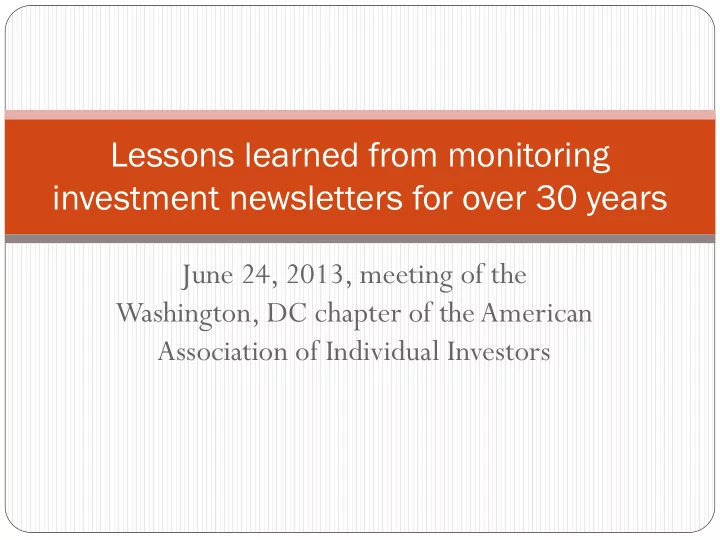

Lessons learned from monitoring investment newsletters for over 30 years June 24, 2013, meeting of the Washington, DC chapter of the American Association of Individual Investors
What I said to this chapter 30 years ago, in June 1983 I asked us to imagine getting back together in 30 years, and putting on an overheard all our individual performances from that day until June 2013 I predicted that the Vanguard Index 500 fund (VFINX) would be ranked in the 80 th percentile
Well… Mutual funds According to Lipper, the VFINX has outperformed 76% of all U.S. domestic equity mutual funds (including sector funds and global equity funds) from 6/30/1983 through 5/31/2013 Investment newsletters According to the Hulbert Financial Digest, the VFINX has outperformed 73% of all investment newsletter portfolios from 6/30/1983 through 5/31/2013 On a Sharpe Ratio, the VFINX outperformed 87% of all newsletter portfolios Survivorship bias The true percentages are higher than 76% and 73%, since these results don’t take survivorship bias into account
Have hedge funds done any better? Hedge funds didn’t exist in 1983 Let’s look at the last decade (through 5/31/2013) The Wilshire 5000 Total Return Index has produced an 8.25% annualized return, versus 6.75% for the Dow Jones Credit Suisse Hedge Fund Index. To be sure, the average hedge fund incurred less volatility (or risk) than the overall stock market But a portfolio divided 60%/40% between the Wilshire 5000 and the Vanguard Total Bond Market Fund would have reduced risk by just as much as the average hedge fund and still made more money
Digging deeper into hedge funds Some hedge funds did better than this overall average, needless to say… But only a small fraction made enough to justify their high fees, according to David Hsieh of Duke University In one study, Hsieh compared each of several hundred equity hedge funds to a control portfolio—designed to have the same risk profile but only owning index funds and other widely available investments. He found that only one out of five did better than its corresponding control portfolio.
Why is it so hard to beat the market? The average thing we do in the markets is a mistake We therefore ought to do as little as possible
Consider… Performance of average stock bought, versus average stock sold 0.00% -0.50% -1.00% -1.50% -2.00% -2.50% -3.00% -3.50% -4.00% 4 months later 1 year later 2 years later Source: Terrance Odean
Professor Odean’s comment… There used to be another human being on the other side of the trade when an individual bought or sold a stock. “Now it’s a supercomputer you’re competing with.” Referring to the famous battle between chess’s Grandmasters and IBM’s supercomputer Deep Blue, Prof. Odean added: “Individuals are no longer playing against Grandmasters; they’re playing against Deep Blue. They will almost certainly lose.”
What if advisers didn’t trade? For all advisers monitored by the Hulbert Financial Digest, froze into place their portfolios at the beginning of a given calendar year. These portfolios made no trades over the subsequent 12 months. At the end of that year, looked to see how many of these advisers did better with their actual portfolios than with these hypothetical frozen portfolios…
2012 returns of frozen portfolios… 2012 performance of portfolios frozen into place on 1/1/2012 (vs. their actual 2012 returns) 60% 50% 40% 30% 20% 10% 0% Frozen beats actual Actual beats frozen by < 1% Actual beats frozen by > 1%
2012 was the best year of the last 30 for advisers’ trading Similar tests were conducted over other years. On average, the percentage of frozen portfolios beating the actual portfolios was close to 67%. Similar results were reached when other researchers have conducted similar tests for mutual funds
Is it possible to identify winning advisers in advance? Even among those who beat the market in one period, depressingly few proceed to beat the market in the subsequent period It’s not just that past performance is no guarantee of future performance In fact, past performance is a depressingly poor guide to future performance
Statistical tests The Hulbert Financial Digest has exhaustively studied how past performance rankings are correlated with future performance rankings The rank correlation coefficient ranges theoretically from +1 (perfectly correlated) to -1 (inverse correlated). A zero coefficient means that the relationship is random
Results The good news is that the coefficients were positive and statistically significant This means that, other things being equal, you should go with an adviser at the top of the ranking than at the bottom The bad news is that these co-efficients were not very high R-squareds rarely were higher than 0.1 This means that 90% of an adviser’s ranking in a given period could not be explained by its past ranking
Persistence among bottom feeders… The strongest correlations appeared at the bottom of the rankings That means that there is a greater chance that an awful performer will continue his losing ways, than there is that a top performer will be able to continue winning The most important role a performance monitor can play, therefore, may be to help steer you away from the losers By following my performance rankings, you have a good likelihood of beating the average adviser. Your odds of beating the market nevertheless remain poor
Same is true for mutual funds and hedge funds Consider hedge funds… If anyone can identify in advance the select few hedge funds that can truly outperform, then the high-paid consultants and managers of funds of hedge funds ought to be able to do that Duke’s Prof. Hsieh found that just 2% of funds of hedge funds earn enough to justify paying their fees
Recommend
More recommend